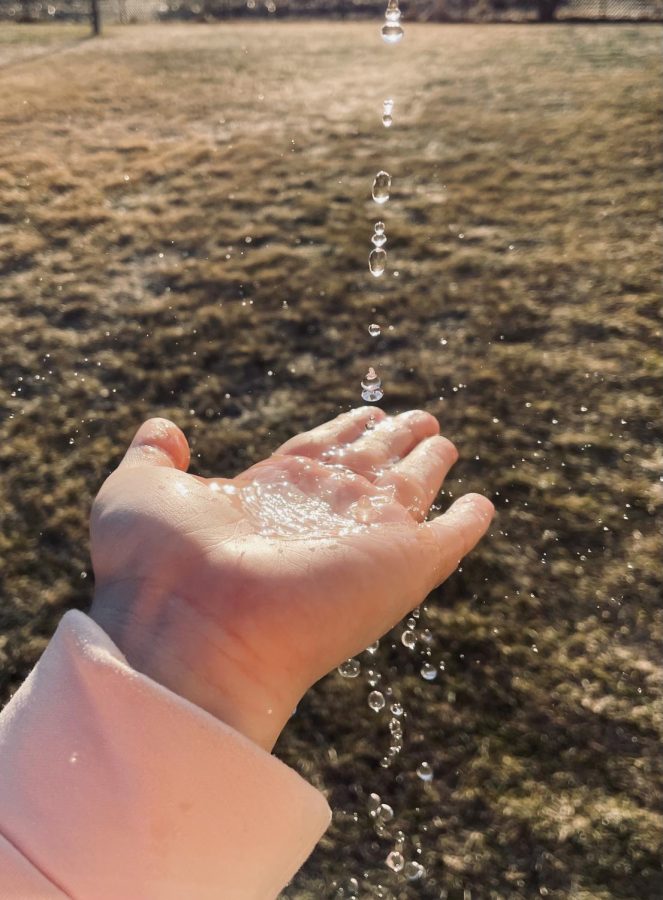All About Water
March 11, 2021
Water. It has no taste yet it tastes so good. It is essential to the point that no one could function without it. Almost everything consists of it, including our bodies. “We’re made up of anywhere from like 60-80% water,” athletic trainer Chris Wiedmann said.
Water has various benefits. “Water helps me a lot because I feel overall more energetic, less tired, and happier as well,” Molly Rogers ’23 said.
Water can also boost physical performance, help clear skin, assist with weight loss, and deal with pain. “It takes away my headaches,” Kenidi Haller ’23 said.
But problems can occur when one does not drink enough water, such as dehydration. “I have been extremely dehydrated and [and when I was,] I felt really light-headed and had headaches. I [had also] fainted,” Haller said.
There are even more effects of dehydration, all of which are unpleasing. “You feel really tired and slow and your liver might hurt,” Lance Boicourt ’23 said. “It just doesn’t feel nice.”
Just like how it is not good when one does not drink enough water, drinking too much water can cause problems as well. Hyponatremia is a condition in which the sodium level in one’s blood is low and can occur when they drink too much water. While it is not as common as dehydration, it is still very dangerous. According to WebMD, “Signs of hyponatremia may include: Nausea with vomiting, fatigue, headache or confusion, cramps or spasms in your muscles, irritability and restlessness, [and] weakness.”
Looking at the conditions of dehydration and hyponatremia is bound to leave one thinking: how much water is enough?
The amount of water a person should drink daily depends on many elements, such as activity level, weight, age, gender, etc., and varies from person to person. Eight 8-ounce glasses of water is the general intake amount that many abide by. But that amount is only suitable for some.
There is one mistake many of us make when it comes to drinking water. “If you’re only drinking [water] until you’re no longer thirsty, you’re actually anywhere [from] 2 to 10 percent still dehydrated,” Wiedmann said.
In order to find out the exact amount of water that one should drink, they can use a daily water intake calculator on a website or through an app.
However, there are certain instances where humans should drink more water than the recommended amount. According to the CDC, “Your body needs more water when you are: in hot climates, more physically active, running a fever, having diarrhea or vomiting.
If drinking enough water daily can prevent numerous health complications, bills, stress, etc. from happening, then why is it so hard to do so? Many factors prevent people from drinking enough water.
One factor is the COVID-19 mitigation strategies. “At school, it is really hard because you have to go out in the hallway just to take a sip, which is honestly inconvenient, so I end up not drinking any,” Rogers said.
The water fountains in schools are closed, which is a huge barrier for those who forget or do not bring their own water bottle. “If I don’t have a bottle, I won’t drink any [water] most of the day,” Boicourt said.
But there is the good news! There are loads of easy ways to stay on top of one’s water game. “[It can] even [be] something as simple as putting a reminder in your phone,” Wiedmann said. Multiple different apps exist, which one can install that will help remind one to drink water and track how much they drink.
Every drink that one consumes will count towards their daily fluid intake. However, choosing water over unhealthy, sugary, and calorie-packed drinks is ultimately the better option, since that way one is doing their body a favor.
But if cutting out unhealthy drinks proves to be too much of a challenge, then incorporate water alongside drinks. “When I went to a camp, they made us drink a glass of water before we could drink like any soda or juice,” Gwyneth Kroner ‘23 said. “So they tricked us into drinking more water and then it just became [a] habit. So now I drink a glass of water before I drink anything else.”
Timing out water consumption so that one drinks a little multiple times throughout the day is also beneficial. “A lot of times I’ll use the analogy when someone’s dehydrated of a dry, crusty sponge that is sitting up at the sink,” Wiedmann said. “It’s hard, it’s a brick. If I splash water on it, it’s not gonna absorb it. But if I slowly get it wet, now it’s going to expand. Now it’s going to ring it out. It’s going to suck more up. Whereas when it’s dry, it splashes off.” Not only does timing out water consumption allow one’s body to absorb water better, but it also makes drinking water easier.
Drinking enough water can truly be a struggle. However, it will get easier over time. “Our body will start to crave [it],” Wiedmann said.






